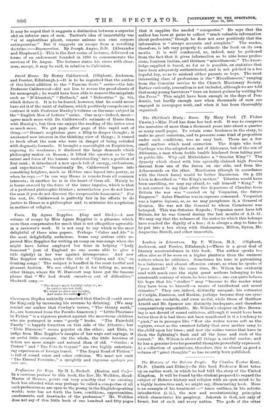David Hume. By Henry Calderwood. (Oliphant, Anderson, and Ferrier, Edinburgh.)—It
is to be regretted that the author of this latest addition to the " Famous Scots " series—the late Professor Calderwood—did not live to revise the proof-sheets of his monograph ; he would have been able to remove the misprints such as " D'Alembut," " Helbach," and " Helvertitts " (p. 85), which deface it. It is to be feared, however, that he could never have rid it of the taint of dullness, which positively compels one to contrast it with Professor Huxley's volume on the same subject in the "English Men of Letters " series. One may—indeed, must— agree much more with Dr. Calderwood's estimate of Hume than with Huxley's, but then one enjoys the reading of the latter ever so much more. We get page after page of this vapid sort of thing:—" Hume's scepticism gave a fillip to deeper thought; it awakened new interest in the thinking view of things ; it roused to fresh effort the men who were in danger of being satisfied with dogmatic formulae. It brought a searchlight on Empiricism, exposing its weakness ; it disclosed the large demands which philosophy makes on Reason ; it lifted the question as to the extent and force of the human understanding' into a position of first rank ; it introduced a new epoch full of energy, enthusiasm, and expectation." Occasionally Dr. Calderwood lapses into something brighter, much as Hobbes once lapsed into poetry, as when he says :—" In one way Hume is remote from all common interests ; in another he is in the heart of them all. Mainly he is borne onward by the force of the inner impulse, which is that of a profound philosophic thinker ; nevertheless you do not know the man if you do not discover the irrepressible humoarist." For the rest, Dr. Calderwood is perfectly fair in his efforts to do justice to Hume as a philosopher and to minimise his scepticism in matters of religion.


















































 Previous page
Previous page